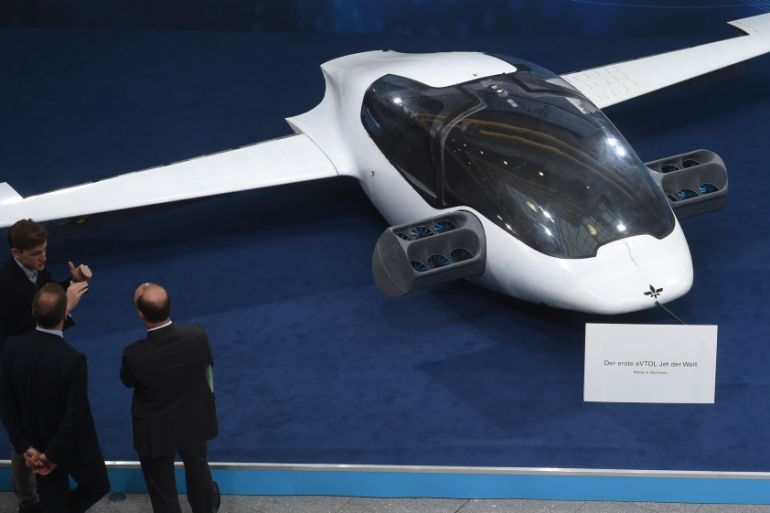World’s first electric-powered air taxi to launch ‘by 2025’
Emissions-free craft unveiled by German company Lilium aims to hit the skies in five years.

Using an app to order an air taxi that won’t break the bank is one test flight closer to being realised.
Thursday, the German startup Lilium announced that it has staged a successful maiden flight of its pilotless, all-electric and five-seater prototype of an air taxi.
Keep reading
list of 4 items‘Triple spending’: Zimbabweans bear cost of changing to new ZiG currency
Boeing hit with 32 whistleblower claims, as dead worker’s case reviewed
US imposes new sanctions on Iran after attack on Israel
The aircraft could serve as a template for a fleet of battery-powered air taxis that the Bavaria-based startup hopes to operate in several cities around the world by 2025, with trials beginning sooner.
But Lillium could face skies crowded with competition. Other startups – as well as giants including Airbus, Boeing and Uber – are also vying to transform urban transport with their own projects.
With challengers’ rotor-powered fliers offering only limited range, Lilium believes its emissions-free aircraft can set itself apart from the pack.
Lilium’s model can take off vertically like a helicopter, and it sports wings for horizontal flight, allowing a top speed of 300 kilometres per hour and a range of 300km (186mph and 186 miles). In crowded metropolitan areas, that could facilitate transportation four times faster than cars.
Both Airbus and Boeing’s models can only travel up to roughly one-third of that distance.
Flights ‘on demand’
The test flight of Lilium’s prototype took place in Munich, Germany at the start of May. The company did not say exactly how long the aircraft was airborne.
“While a maiden flight is always a moment of truth for a business, the jet performed exactly as expected and responded well,” Leandro Bigarella, Lilium’s head of test flights, said in a statement.
Controlled from the ground, the five-seater jet follows on the heels of the firm’s two-seater prototype, which successfully flew in 2017.
The company is billing its proposed “on-demand air taxi service” as “urban air travel that is quiet, safe and environmentally positive” and will offer an app to let passengers find nearby landing pads for a ride “comparable in price with a taxi”.
Offering a larger cabin than competitors is key to the air taxi’s design, with five seats making for “an economy of scale you just can’t achieve with two,” said Lilium cofounder and chief executive Daniel Wiegand.
Lillium was founded in 2015 by Wiegand and three friends from the Technical University of Munich. It has raised around $100m from investors.
But the startup – and other air-taxi hopefuls – will have to hack through a forest of regulations, safety concerns and public scepticism to build a sustainable business.
The US-based Aerospace Industries Association predicted in March that with artificial intelligence at the helm, such aircraft “will be a part of everyday commutes” by mid-century.